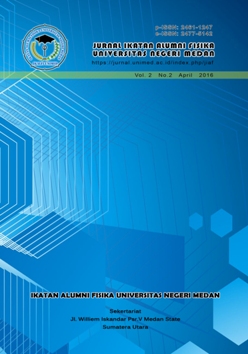PENGARUH MODEL PEMBELAJARAN KOOPERATIF TIPE KELOMPOK INVESTIGASI (GROUP INVESTIGATION) DENGAN METODE CURAH PENDAPAT(BRAINSTORMING) TERHADAP HASIL BELAJAR SISWA PADA MATERI FLUIDA DINAMIS KELAS XI SEMESTER GENAP DI SMA NEGERI 1PARBULUAN T.P 2015/2016
DOI:
https://doi.org/10.24114/jiaf.v2i2.4372Keywords:
Quasi Eksperimen, Pembelajaran Kooperatif tipe kelompok, investigasi (group investigation), metode curah pendapat (brainstorming) KonvensionalAbstract
Penelitian ini bertujuan untuk mengetahui pengaruh model pembelajaran kooperatif tipe kelompok investigasi (group investigation) dengan metode curah pendapat (brainstorming)terhadap hasil belajar siswa pada materi Fluida Dinamis di kelas XI semester genap di SMA Negeri 1 Parbuluan T.P. 2015/2016. Jenis penelitian ini adalah quasieksperimen. Populasi dalam penelitian ini adalah seluruh siswa kelas XI semester genap SMA Negeri 1 Parbuluan yang terdiri dari dua kelas. Sampel penelitian ini diambil dua kelas yaitu kelas XI IPA 2 (sebagai kelas eksperimen) dan kelas XI IPA 3 (sebagai kelas kontrol) yang masing-masing berjumlah 30 siswa dan ditentukan dengan teknik cluster random sampling. Kemudian diberikan perlakuan yang berbeda, kelas eksperimen dengan model pembelajaran kooperatif tipe kelompok investigasi (group investigation) dengan metode curah pendapat (brainstorming) dan kelas kontrol dengan pembelajaran konvensional. Data penelitian ini ada dua macam yaitu hasil belajar dan observasi aktivitas siswa. Dari hasil uji t diperoleh thitung = 3,01 sedangkan ttabel = 1,67. Karena thitung > ttabel maka Ho ditolak, yang menunjukkan bahwa hasil belajar siswa pada materi Fluida Dinamis dengan menerapkan model pembelajaran kooperatif tipe kelompok investigasi (group investigation) dengan metode curah pendapat (brainstorming) terhadap hasil belajar siswa lebih baik daripada pembelajaran konvensional di kelas XI semester genap di SMA Negeri 1 Parbuluan T.P. 2015/2016.References
Arends, R.I, (2008), Learning to
Teach. Belajar Untuk
Mengajar,. Pustaka Belajar,
Yogyakarta
Arikunto, S., (2010), Prosedur
Penelitian, PT Rineka Cipta,
Jakarta.
Dahar., (2006), Teori Belajar dan
Pembelajaran, Erlangga,
Jakarta
Dimyati dan Mudjiono., (2012),
Belajar dan Pembelajaran,
Rineka Cipta, Jakarta
Giancolli., (2001), Fisika, Erlangga,
Jakarta.
Istarani., (2012), Kumpulan 39
Metode Pembelajaran, CV.
Iscom Medan, Medan
Kanginan, M., (2013), FISIKA untuk
SMA Kelas XI, Erlangga,
Jakarta
Purwanto., (2011), Evaluasi Hasil
Belajar, Pustaka Belajar,
Yogyakarta
Sudjana,N., (2009), Penilaian Hasil
Proses Belajar Mengajar, PT Remaja Rosdakarya,
Bandung.
Sudjana., (2001), Metode dan Tehnik
Pembelajaran Partisipatif,
Falah Production, Bandung
Sudjana., (2005), Metode Statistika,
Tarsito, Bandung.
Downloads
Published
Issue
Section
License
Authors who publish with this journal agree to the following terms:- Authors retain copyright and grant the journal right of first publication with the work simultaneously licensed under a Creative Commons Attribution License that allows others to share the work with an acknowledgement of the work's authorship and initial publication in this journal.
- Authors are able to enter into separate, additional contractual arrangements for the non-exclusive distribution of the journal's published version of the work (e.g., post it to an institutional repository or publish it in a book), with an acknowledgement of its initial publication in this journal.
- Authors are permitted and encouraged to post their work online (e.g., in institutional repositories or on their website) prior to and during the submission process, as it can lead to productive exchanges, as well as earlier and greater citation of published work (See The Effect of Open Access).

